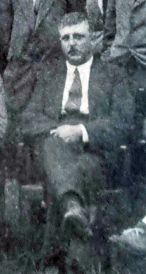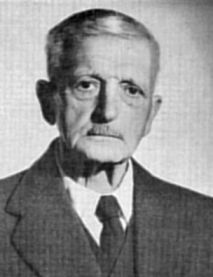View entry
Name: TOOGOOD, John James MBE 'Jack'


Photo Source: sitting - Kenya Observer 28 Apr 1923
Nee: uncle of George James Sutton
Birth Date: 23 Oct 1869 Eling, Hampshire
Death Date: 27 Sep 1954 Wynberg, S. Africa
First Date: 1904
Profession: Farmer; Standard Bank of S. Africa bank official
Area: Nakuru, Hut - partner with Howard Fairfield, 1937 Babati Sabukia
Married: no
Book Reference: KFA, R.G. Ridley, KAD, North, Red 25, Red 31, Hut, EA & Rhodesia, Red 22, Land, Gazette, North, Leader14, Rift Valley, Red Book 1912
War Service: RN
General Information:
KFA - won first place for yellow maize at 1913 Nakuru Show.
KFA - Present at first meeting of Wheat Growers' Association - June 1911.
KFA - Delegate to the Maize Conference of 1923 [photo]. Chairman of KFA 1921-24
KFA - One of the architects of the BEA Farmers' Association was Mr J.J. Toogood, who resigned from his position as general manager of the Standard Bank of South Africa at the end of 1919 to devote his whole attention to 3 already thriving farms in the Nakuru district. The plain farmers, ignorant of commerce, who had formed the Association were lucky to be guided at the start by a businessman of wide experience, hard-headed devotion, puritan habit and rigorous integrity. He gave much of his time to the Association's business and set on it a stamp that has endured.
John J. Toogood was born in Hampshire in 1869 and went to South Africa at the age of 18 to serve the Standard Bank in many places, and to open, in 1893, the first branch in Salisbury, which he approached partly by narrow-gauge railway, partly by ox-cart and partly on foot, taking six weeks on the journey. He saw active service in the Matabeleland campaign. On long leave in 1905 he visited EA to shoot game and returned deeply impressed by the country's possibilities.
In 1910 his Bank sent him to open branches in Nairobi and Mombasa. This he did early in 1911. While carrying out the duties of general manager he bought land near Nakuru and retired at the age of 50 to become "a real working farmer, living austerely and looking for the same standards of hard work and near-austerity in those whom he employed". All his farms were run efficiently as business propositions and he pioneered in pasture research and management.
His nephew, Mr George Sutton, managed and eventually inherited his estate, for he lived and died a bachelor. "Of his character," a friend has written, "the outstanding features were lack of fear, and self-sufficiency; knowing exactly where he was going and how to get there. His track lay always along the middle of the road. He did not suffer fools gladly, but was always ready to assist when called upon and was a splendid host. Through good days and bad - and there were many of the latter - he never lost faith." .........…
In 1920 he took over from Mr Conway Harvey as Chairman of the BEA Farmers' Association.
Letter from R.G. Ridley - '...... J.J. Toogood joined him [Percy Barry] later in the year [1910] and was given the task of opening an office in Nairobi in what was previously a shop on the corner opposite to the main entrance of Barclays Chief Office in what was later to be called Delamere Avenue. One of his first customers was Major H.F. Ward who, following a shooting trip in Kenya, had left the Army and had established himself as an Estate Agent. One of his friends was J.A. Morrison, a wealthy Army officer, who was also in Kenya on a shooting trip. Morrison was convinced that considerable potential existed for a suburb of Nairobi founded on a Club with sporting facilities. They found what they wanted and arranged to purchase the "farm" that later became Muthaiga.
Freddie Ward and Morrison, having worked out what would be needed for the purchase, subsequent survey, club etc went off to the Bank to see Toogood. Morrison who was giving Ward a Power of Attorney said that he wanted to arrange for the necessary funds to be available and would Toogood accept a cheque on London. Toogood replied that he would be only too pleased and nearly fell out of his chair when Morrison produced a cheque book and wrote him out a cheque for £60,000. In those days a £60,000 credit at a Branch recently opened was manna from Heaven. ....... Toogood retired, I think around 1919, and with the help of a large overdraft from the Bank had purchased a property at Bahati, in the hills to the right of the Solai Road some 15 miles from Nakuru. A very fertile area.
Freddie Ward later bought a farm in the same area. In 1933/35 following the conversion from rupees and the effects of the 1929 American Stock Exchange collapse, aggravated by drought and locusts, farming was on its beam ends. .... Toogood, of course, was unable to meet the interest on his overdraft let alone any reduction from farm profits so the Bank agreed not to charge interest provided he started to sell off some of his land. In 1933 the lower lying land round Nakuru was being sold by the Banks that had taken it over at 10/- and acre. These farms were merely grazing and "Nakuruitis" in cattle - their condition deteriorated unless moved to another area - not diagnosed until about 1940 as a cobalt deficiency did nothing to improve such land values.
Despite pressure by the Bank Toogood refused to sell under £7 an acre. However sales from time to time of small acreages often to adjacent farmers kept the Bank from drastic action. In 1946 I returned to Nakuru as manager. The last of the Bahati land had recently been sold and Toogood had moved to a farm on the Thomson's Falls road about 5/6 miles from the Town Centre. He must now have been close on 80 and his nephew Sutton was managing the property. Toogood's Bahati overdraft was now down to a figure he could manage so he wrote a letter to the Bank in London which he asked me to pass on to them. After thanking them for the understanding and generous treatment that had been accorded him he went on to say how sad it was that the nuts came to the monkey after it had lost its teeth! ...…
Toogood was a self-contained bachelor. I hardly ever saw him in Nakuru although, I suppose, he must have been a member of the Rift Valley Club, I doubt if he ever frequented it. Without doubt he was soured by his experience at Bahati. Younger farmers faced with debt impossible to repay just handed over to the Bank and went off to start a new life. Toogood may have felt early in the 1930s too old to start again. He may also have felt a sense of loyalty to the Bank combined, perhaps, with a feeling that if he remained on Bahati and did his best to just keep things ticking over, he could maintain the asset's value to the eventual benefit of both the Bank and himself. There is no doubt the Suttons had a tough time. He was recognised locally as a really good farm manager but it was seldom, I think, that Toogood acknowledged this. .......... in 1949. By then, I think, the general impression was that Sutton who had "put up with" quite a bit, would stay on with Toogood until he died. Presumably he had been told he would inherit the farm ............'
KAD 1922 - Director of B.E.A. Framers' Association Ltd.
East Africa & Rhodesia - 28/10/54 - Mr John James Toogood, one of the pioneers in Central and East Africa for the Standard Bank of South Africa, who has died in the Union at the age of 84, joined the staff of the bank in 1887. In "Sixty Years North of the Limpopo" a book recently issued by the Standard Bank there appears the following account of one of his early journeys:- 'John Toogood was the first of the bank's staff to make the journey to Salisbury via Beira, when he went up in 1893 from Port Elizabeth to take over from Wilfred Honey as accountant. From Fontesvilla he travelled on the narrow-gauge railway sitting on the floor of an open truck, exposed to the sun and hot sparks from the engine, which burned wood for fuel. …….
He first went to East Africa in 1910, and in the following year opened the Nairobi branch. After his retirement 8 years later he settled on a farm near Nakuru, where he concentrated mainly on dairying and the improvement of pastures. As a director of the KFA his business ability and experience were of great value. During the depression of the thirties he went to the Lupa goldfields in Tanganyika and began business as an assayer and gold buyer, returning to Kenya when agricultural prices had recovered. Mr Toogood was unmarried.
Red 22 - Director, BEA Farmers' Association Ltd.
Land - 1906 - J.J. Toogood - Building, 1 acre, Nakuru, 7-12-04, Registered 3-11-06
Land 1909 - J.J. Toogood - Grazing and agricultural, 2447 acres - Uasin Gishu - 17/5/08 - Leasehold under Occupation Licence from 5 to 99 years from 1/5/09 - Registered 1/7/09
Land 1909 - J.J. Toogood - Grazing and agriculture, 3311 acres - Rift Valley - 10/10/04 - Leasehold for 99 years from 1/5/06 - Registered 21/2/10
Gazette - 7/4/15 - Liable for Jury service, Nairobi District - J.J. Toogood, Standard Bank
North - Arr. Mombasa from south 7/8/1904; Land Grant application, Nakuru 7/12/1905; Settlers Game Licence, Nairobi Oct-Dec 1904
Rift Valley - Member of the Rift Valley Sports Club - Jan 1929 - Elected - 29 Dec 1916 - J.J. Toogood
Red Book 1912 - J.J. Toogood - Nairobi
Gazette - 12/11/1919 - Register of Voters - Nairobi, North Area - John James Toogood - Bank Manager, Muthaiga
Stephen Ellis's ledger also shows Toogood & Howard, Nakuru, July 1909.
